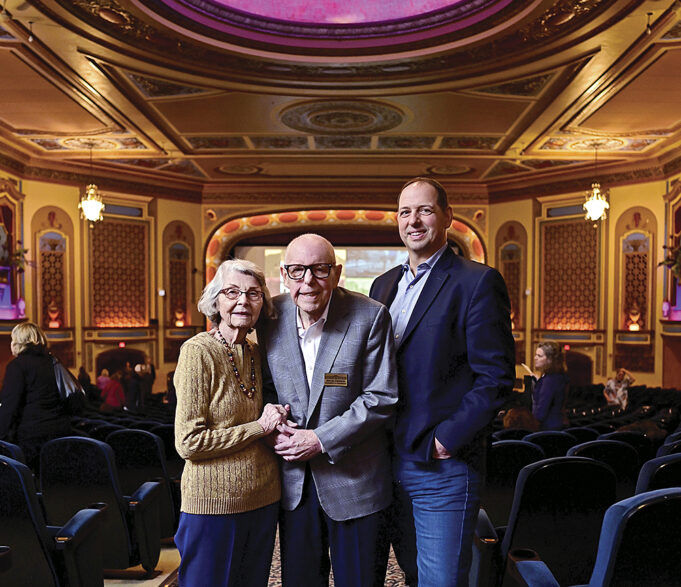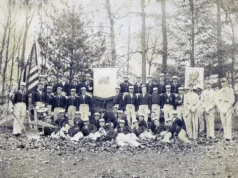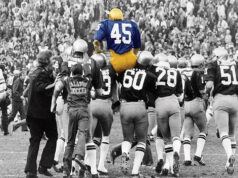BY VALERIE HARDY | Photos Victor Hilitski
For many attending the sold-out premiere of the documentary film “History Happens Here: The Tivoli Theatre” on May 2, it was a very meta experience. They were watching a film about the Tivoli Theatre in the Tivoli Theatre.
Produced by independent filmmaker Jim Toth in conjunction with the Downers Grove Historical Society, the documentary honors the 95-year history of one of Chicagoland’s oldest and best-preserved theaters. It also chronicles the storied lives of the Johnson family, the theater’s long-running proprietors.
See related story: Focus on the Filmmaker: Jim Toth
The premiere began with an organ performance followed by Downers Grove Historical Society Director Rich Kulovany introducing the 2023 Historians of the Year, Willis and Shirley Johnson, who received a standing ovation.
Willis’s son, Chris Johnson, the current CEO of the family’s Classic Cinemas business, accompanied the couple on stage. Chris recalled how his father was using his walker that evening.
“I told him he could accept the recognition from his seat, but he kept pointing up to the stage,” Chris said. “It was so much fun to see his reaction. It was a culmination of appreciation and acknowledgment that really meant a lot to him.”
Chris later shared how much the recognition and film (which he described as “a bit of a love letter” to Willis and Shirley for all the work they did) touched him as well. He said candidly, “My dad is getting up in age a bit, so this could not have happened at a better time.”
The documentary was so popular that advance tickets sold out just days after their release. To accommodate the demand, Chris offered to host an encore presentation of the film at the Tivoli Theatre the morning of May 13.
“History Happens Here: The Tivoli Theatre” received rave reviews from its early viewers. For those who may have missed it, the documentary is viewable on demand at downersgrovehistory.org.
The Historic Tivoli Theatres
The Tivoli Theatre opened in 1928 during the transitional period from silent films to “talkies.” In fact, the Tivoli was one of the first theaters in the nation built specifically for motion pictures with sound. It also boasted a stage that, while shallow, easily accommodated vaudeville and other small-scale productions.
In the mid-1950s, wider seats were installed with greater distance between rows, reducing seating capacity to 1,012.
Over the next two decades, the theater remained relatively unchanged but experienced general wear and tear. In 1976, Willis Johnson purchased the Tivoli property and began extensive renovations.
Located in the heart of downtown Downers Grove, the Tivoli Theatre building occupies nearly half a block and contains a bowling alley, residential hotel, and storefront business and office spaces.
Over the years, the Tivoli Theatre has featured performers like Sonny & Cher, Julie Andrews, and Poi Dog Pondering. Actors, comedians, and authors such as Anthony Michael Hall, Jim Flannigan, and Nicholas Sparks, respectively, have taken the stage at the theater.
The Tivoli is also home to the After Hours Film Society, a not-for-profit organization committed to bringing foreign, art, and independent films to suburban audiences. The theater has also hosted numerous dance recitals and school variety shows and has even been the backdrop for weddings.
The Johnsons drew the line at holding funerals there. However, they might rethink the “no funeral policy” when the time comes to hold a celebration of life to honor Willis, Chris said.
Nearing its hundredth anniversary, the Tivoli Theatre is one of the longest continually operating movie theaters in Chicagoland, no small feat given the numerous obstacles it has faced.
It survived the Great Depression soon after opening, competition with shopping malls in the 1970s and 1980s, a storm blowing its roof off in the 1990s, and – more recently – the advent of streaming services and a global pandemic that shut it down. Chris attributes the Tivoli’s endurance to a willingness to evolve.
For example, for many years, the Tivoli operated as a fully restored single-screen movie theater showing second-run films, but it ultimately shifted to screening new releases. Then, in 2021, the Johnsons converted an adjacent storefront into an intimate second theater space, aptly named the Willis Theatre, which features over 30 heated recliners.
Classic Cinemas and the York Theatre in Elmhurst
After taking over the Tivoli Theatre’s operations by default when the film exhibition company that was leasing the theater abruptly closed for “remodeling,” Willis established the Classic Cinemas brand. Willis and his family quickly grew the business and currently operate 16 theaters with a collective 137 screens.
In 1982, Classic Cinemas acquired the York Theatre, the fourth in its portfolio. Built in Elmhurst’s City Centre in 1924, the York Theatre originally featured a Spanish motif, but to keep up with the times, in 1938, its exterior and interior were remodeled to an Art Deco style.
The York originally featured a large, single-screen theater, but in 1991, Classic Cinemas completed an extensive renovation, creating three auditoriums while retaining many of the historic elements of the original space. There have been numerous additional expansions to the York Theatre since Classic Cinemas purchased it, and today it features 10 distinct auditoriums.
Classic Cinemas is the largest movie theater business in Illinois and is in the top 40 in the nation. Yet the Johnsons’ business savvy goes beyond the movie theater industry as well. Chris explained how they often acquire real estate near their theaters, perhaps most significantly in Elmhurst.
“We seek a mix of regional, national, and local tenants that all lend to having a successful downtown,” he said. “Our goal is to drive foot traffic and create a complimentary night life to our theaters.” Classic Cinemas received the 2005-2006 Beautification Recognition Award for its commitment to making Elmhurst an ideal location for business, family, and life.
Beyond his work related to Classic Cinemas, Willis volunteered in various civic capacities over the years, and he was the founding president of the National Association of Theatre Owners of Illinois. Chris is the organization’s current president. “I’m turning into my dad, like those commercials,” Chris joked, but he acknowledged his pride in carrying his father’s work forward.
He also said “Shirley is an unsung hero,” always by Willis’s side, within and beyond their business ventures. This is one of the myriad reasons Chris is grateful to the Historical Society and Toth for recognizing Willis and Shirley and creating the corresponding documentary. He said, “They did an amazing job and should be applauded.” ■












